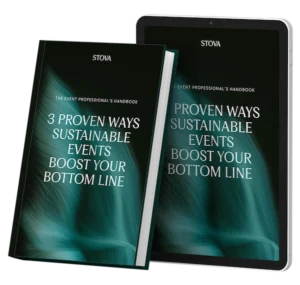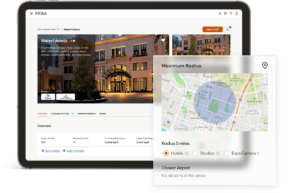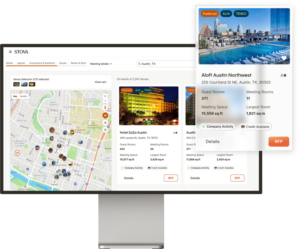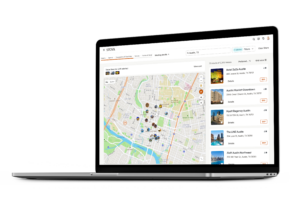Venue Sourcing for Event Planners
May 25, 2023
Selecting the best venue for your event is one of the most important decisions planners face. A well-chosen venue sets the tone, creates memorable experiences, and contributes to the overall success of you event. You want the right space to accommodate your event needs, in the right location, at the right price, and under the right conditions. But you also want the “wow” factor. It’s a tall order, but with the right venue sourcing tools, it is possible to have it all.
We’ll help you answer key questions about event sourcing, including what to consider and how to book so you can get the right venue with the most impact and achieve your event goals.
How Do You Source a Venue?
Before creating a list of possible venues it’s important to understand the purpose and business goals of the event. Meet with key stakeholders and decision makers to align on and specify event goals. You’ll also want to define what a successful outcome looks like. This will help you create a strategy for setting goals and measuring achievement. Once you have clear and defined targets and metrics of success, you can begin sourcing venues that align with your vision.
But this phase of exploration and research can be daunting. There is so much to keep track of and organize. File folders and spreadsheets were sufficient in the past, but now planners need sophisticated systems and tools that will track all the necessary details for making decisions between multiple venue options. While you can still use spreadsheets and pick up a phone, technology and tools have come a long way to facilitate venue sourcing from start to finish.
Leverage technology.
Strategic venue sourcing and selection software helps meeting planners sort through hundreds of thousands of possible venues (and rooms) at the click of a few buttons with a refined search. It also makes the administrative processes behind scouting venues and compiling bids much easier than handling it all on your own.
For example, Stova’s event technology simplifies event sourcing and gives you the power to better negotiate with venues. This enables you to:
- Spread the web to narrow your search. Filter out venues that don’t meet your criteria.
- Improve Request for Proposal (RFP) efficiency. Support your internal teams with an RFP tool to ensure quick bids with a high response rate.
- Manage your bids. Track bid evolution, concessions offered, and all communications in one place.
- Save your favorites. Much like popular real estate search sites, mark your favorite venues to easily compare, share experiences, and see venues booked company-wide to leverage negotiations.
- Manage your budget. Control and track your event expenditures, revenue streams, and overall financial performance. Use real-time event data for ROI insights.
Trusting a technology partner is the best way to simplify venue sourcing. It eliminates the hassle of finding and FOMO on the perfect event venue. Plus, you can save time, better manage your (shifting) budget, and easily share details transparently with stakeholders, clients, and partners.
What Should You Consider When Selecting a Venue?
With stakeholder buy-in, definitions and measures of success top of mind, begin the process of finding the right venue for your event by asking big-picture questions:
- What kind of atmosphere do you want to create?
- What logistical needs do you have, such as capacity, layout, amenities, parking etc.?
- What type of location and accessibility do you need?
- What are the budget constraints?
These big picture considerations help you narrow down the types of venues that will work best for your event. But small details go a long way to help refine your search. Remember to consider these details as well:
Consider the unspoken stakeholder needs.
Yes, this can be a tough one, which is why it’s so important to have stakeholder meetings ahead of time to level-set expectations. But we know some details can go uncommunicated, and ultimately, it’s the planner’s job to anticipate them. These considerations can affect how you use the venue space and may qualify or eliminate your options. These stakeholder considerations may include:
- Travel expectations
- Using a preferred brand for a venue or travel
- Perks and luxuries that stakeholders, attendees, and partners have been had in the past
- Ensuring time and space for meet and greets
Consider travel and travel-related logistics.
Understand how attendees and partners will be getting to the venue. How far from the airport is the venue? What forms of transportation or ridesharing services are available? How much parking space will you need? These questions will help you narrow down your venue choices.
Consider security.
Check security needs and protocol. Inquire about restrictions on vendors. Some venues require you to use their approved list. As a safety precaution, find out what other groups will be using the venue at the same time and make sure you have closed or controlled access to the space you would be using.
Consider accessibility.
Don’t get stuck without access afterhours. If you need to start (or gain access) early in the day or there’s a possibility your group could finish after traditional business hours, understand what access you’ll have to the building and who you should contact if there’s an issue. Make notes of whether the venue can accommodate you and all possible “what-if” scenarios.
Consider event flow.
Understand the flow of the event and how it needs to work. Think about activities such as breakout sessions, leadership exercises, demonstrations, networking opportunities, etc. This will dictate space requirements, seating arrangement, room set up, and tech/AV needs.
Consider attendee type and counts.
High numbers of attendees might make some solutions for attendance or registration better than others. Also, especially for large corporate meetings, consider the type of attendees. For example, know what departments are involved, how attendees want to work or meet, and the relationship dynamics of the attendees. Understanding attendee details ahead of time will help you assess the needs of the group, and thus, the space.
Consider comfort.
What will it take to keep your attendees comfortable throughout the event? Breaks, for example, are critical to team productivity and continuing conversations. Find out what venues can provide for comfortable space and taking breaks. This may include outdoor space, private areas for phone calls or check ins, and areas for snacks and meals. Also, make sure you don’t overcrowd a room. A small room should only be used for short meetings, as people generally prefer the option of space.
Consider technology needs.
Inquire about technology expectations and get specifics. Understand what equipment, set up, and tech services are offered or provided by the venue. Know what limitations, regulations, or safety/security provisions you and the venue must adhere to. Don’t forget to ask about adaptors and connectors for tech. While many hotel meeting rooms have this covered, a non-traditional meeting space may not. Be prepared so you know what to expect. These considerations may not only help to qualify a venue but also may influence your decision to have onsite tech support throughout your event.
Consider opportunities for customization.
Venues often present packages upfront, but that doesn’t mean you can’t get creative with seating, food, breaks, and more. Without making assumptions, ask and be specific about customization options and ideas. Understand these details before signing a contract.
Consider your reputation and mission.
These days reputation is everything, and it can crash in a flash, even if only temporarily. Do your research and stay current on news headlines. Attach your company and your event (and those of your partners) with a venue that not only advances the mission of the meeting but reflects positively on your organization as well.
Selecting the perfect venue may often overwhelming. It is a lot to consider, and checking all the boxes can be challenging. However, creating a process for gathering information from stakeholders and venues, aligning details with your budget, and using the technical tools necessary to do it quickly and efficiently will set you up for success.
How Do You Book a Venue?
Once you’ve considered all the details, both big and small, you’re probably ready to book. What’s the best way to book and secure the best deals without overlooking details? Experienced event planners use RFPs to negotiate costs while keeping track of the fine print.
Good RFP tools can be a big driver in securing better deals with venues. They can empower event professionals to negotiate more effectively, get more responses, and save valuable time when it comes to booking a venue. The benefits of using RFPs are:
- It saves time. You get faster responses, which leads to a quick turnaround.
- You can get the answers you need to make critical decisions when booking.
- Comparisons are easier to make versus the standard format.
- You can quickly analyze details so you can request modifications.
- All your information is organized in one place for convenient access and reference.
- Fewer errors are made.
- You can get better a better deal than the venue’s automated quote.
- Data is formatted and sharable, so you don’t have to manually manipulate information when presenting it to a boss or client.
- Deals and discounts are reported clearly so you can track savings.
RFP tools can help with the biggest frustrations event planners have when negotiating with venues, particularly slow response times, not receiving enough information, not having transparency, and not accounting for past bookings.
Any tool which saves time and makes the process better for both the event planner and the venue is likely to enable better deals to be agreed upon.
Booking with RFPs
If you only use online tools when researching venues, you could be foregoing the benefits of using technology for the entire planning process. When it comes to booking, a tool can help. For example, many planners find it frustrating when promises are made by the sales team during the negotiation process but are not mentioned in the contract or not honored by the operations team. Using an RFP tool can alleviate this by allowing you to confirm your expectations and terms at the initial inquiry stage, track negotiation discussions and proposals, and uses the final agreed terms to generate the final contract.
Electronic contracts are also becoming more common. They are legally binding and faster than signing and returning a traditional paper contract. Some eRFP tools integrate with event management software. When contracts are signed, you can pull data from the eRFP into the registration site. This saves you time from having to re-enter dates, venue address, room details, event agendas, etc., making it quicker to get event tickets on sale.
Conclusion
Whether you are a first-time planner or a seasoned pro, sourcing a venue for your next meeting or event has its challenges. But there are robust solutions available to help simplify and streamline the process. Remember to:
- Align your event vision with stakeholder goals and metrics of success to begin the sourcing process.
- Leverage technology to find the venues that meet your needs. Make swift, side-by-side comparisons, store details and information in one place, and easily share or present data to key decision makers, partners, or clients.
- Get into the nitty gritty with your considerations. Think through travel logistics. Envision how your event will flow and how attendees and partners will interact to use the space. Be prepared for all technology requirements and have contingency plans. Adhere to safety precautions and know who to contact if something goes awry. Don’t skimp on comforts and sustenance.
- Get end-to-end support from sourcing through booking by using a suitable RFP tool. It’s more efficient than spending time chasing down venues for responses or dealing with the common frustrations of negotiations.
Stova venue sourcing simplifies the process of booking venues and delivers visibility into total meeting spend. Manage the many details associated with sourcing meetings or events and capture key data to help empower negotiations. Stova is committed to providing a dedicated, professional end-to-end service throughout the entire planning process. Request a demo to see how it works.
Whether your event is virtual, hybrid, or in-person, enhance your attendee’s journey with an event ecosystem built for your audience. Ready to walk through Stova's event technology solutions? Schedule some time with us today.




